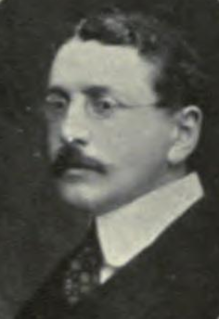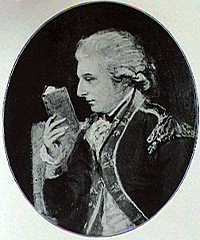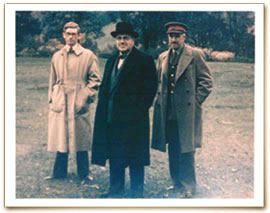 W
WGeorge Robert Ainslie (1776–1839) was a Scottish general of the British Army, with a short lived and controversial career in the Caribbean, a Lt. Gov. of Cape Breton, and noted for his coin collecting pursuits.
 W
WWalter John Montagu Douglas Scott, 8th Duke of Buccleuch and 10th Duke of Queensberry, was a British peer and Conservative politician. He was the son of John Montagu Douglas Scott, 7th Duke of Buccleuch and Lady Margaret Alice "Molly" Bridgeman. His sister, Alice, married Prince Henry, Duke of Gloucester in 1935, becoming a member of the British Royal Family.
 W
WColonel Aylmer Spicer Cameron,, born in Perth, was a Scottish recipient of the Victoria Cross, the highest and most prestigious award for gallantry in the face of the enemy that can be awarded to British and Commonwealth forces.
 W
WMajor-General John Talbot Coke (1841–1912) of Trusley in South Derbyshire was a British Army officer that served in the 25th Foot between 1859 and 1901. He wrote a family history book called "Coke of Trusley, in the County of Derby, and Branches Therefrom; a Family History" which was published in 1880. He was a Brigade Commander during the Second Boer War having a prominent role in the battles of Spion Kop and the Tugela Heights during the relief of Ladysmith.
 W
WLieutenant General John Cooper, is a former senior British Army officer. From March 2008 he was the Deputy Commander of Multinational Force-Iraq (MNF-I), the operational-level headquarters in Iraq, and the Senior British Military Representative-Iraq. As Deputy Commander, he was the principal assistant to General Raymond T. Odierno of the United States Army. He stepped down on 4 March 2009, and retired from the army later that year.
 W
WGustavus Hamilton Blenkinsopp Coulson, was a British Army officer and an English recipient of the Victoria Cross, the highest decoration for gallantry "in the face of the enemy" awarded to members of the British and Commonwealth armed forces.
 W
WGuy Carleton, 1st Baron Dorchester, known between 1776 and 1786 as Sir Guy Carleton, was an Anglo-Irish soldier and administrator. He twice served as Governor of the Province of Quebec, from 1768 to 1778, concurrently serving as Governor General of British North America in that time, and again from 1785 to 1795. The title Baron Dorchester was created on 21 August 1786.
 W
WLieutenant-Colonel Henry Pleydell Dawnay, 3rd Viscount Downe FRS, was a British soldier and politician.
 W
WSir Henry Erskine, 5th Baronet was a Scottish soldier and politician.
 W
WMajor-General James Grant was born in Middlesex about 1778, the son of James Grant of Dalvey, of the line of the Baronets Grant of Dalvey, Elgin, themselves an offshoot of Grant of Grant. His father was an official of the East India Company and served in India for many years before retiring to Vache Park, Buckinghamshire and later to Goldington Grange, Hertfordshire. His actual mother is not yet known, although his step-mother was Harriet Montagu, daughter of the 5th Earl of Sandwich.
 W
WDonald Gray was a South African actor, well known for his starring role in the British TV series Mark Saber, for providing the voices of Colonel White, Captain Black and the Mysterons in Captain Scarlet and the Mysterons, and for being the reason that Donald Marshall Gray changed his name to Charles Gray when he became an actor. Perhaps not coincidentally, in some spin-off media Colonel White's real name is stated to be Charles Grey.
 W
WField Marshal Douglas Haig, 1st Earl Haig, was a senior officer of the British Army. During the First World War, he commanded the British Expeditionary Force (BEF) on the Western Front from late 1915 until the end of the war. He was commander during the Battle of the Somme, the Battle of Arras, the Third Battle of Ypres, the German Spring Offensive, and the Hundred Days Offensive.
 W
WC. Morton Horne (1885–1916) was an Irish writer and musical comedy performer who lost his life on a battlefield in France during the First World War.
 W
WBrigadier Charles Edward Hudson, was a British Army officer and an English recipient of the Victoria Cross, the highest award for gallantry in the face of the enemy that can be awarded to British and Commonwealth forces.
 W
WLieutenant-Colonel Graham Seton Hutchison was a Scottish First World War army officer, military theorist, author of both adventure novels and non-fiction works and fascist activist. Seton Hutchison became a celebrated figure in military circles for his tactical innovations during the First World War but would later become associated with a series of fringe fascist movements which failed to capture much support even by the standards of the far right in Britain in the interbellum period. He made a contribution to First World War fiction with his espionage novel, The W Plan.
 W
WRobert McGregor Innes Ireland, was a British military officer, engineer, and motor racing driver. He was a larger-than-life character who, according to a rival team boss, "lived without sense, without an analyst and provoked astonishment and affection from everyone."
 W
WHenry Keswick was a British Conservative politician and businessman and member of the Executive Council and Legislative Council of Hong Kong.
 W
WMajor Samuel Hill Lawrence VC, born in Cork, was an Irish recipient of the Victoria Cross, the highest and most prestigious award for gallantry in the face of the enemy that can be awarded to British and Commonwealth forces.
 W
WGeneral Lord George Henry Lennox was a British Army officer and politician who sat in the House of Commons from 1761 to 1790.
 W
WLieutenant-Colonel John Frederick MacKay was a Scottish recipient of the Victoria Cross, the highest and most prestigious award for gallantry in the face of the enemy that can be awarded to British and Commonwealth forces.
 W
WGeneral Robert Melvill LLD was a Scottish soldier, antiquary, botanist and inventor.
 W
WMajor-General Eric Grant Miles CB DSO MC was a senior British Army officer who saw active service during both World War I and World War II, where he commanded the 126th Infantry Brigade in the Battle of France and the 56th (London) Infantry Division in the final stages of the campaign in Tunisia.
 W
WGilbert John Elliot-Murray-Kynynmound, 4th Earl of Minto,, known as Viscount Melgund by courtesy from 1859 to 1891, was a British peer and politician who served as Governor General of Canada, the eighth since Canadian Confederation, and as Viceroy and Governor-General of India, the country's 17th.
 W
WColonel George Napier, styled "The Honourable", was a British Army officer, most notable for his marriage to Lady Sarah Lennox, and for his sons Charles James Napier, William Francis Patrick Napier and George Thomas Napier, all of whom were noted military officers, collectively referred to as "Wellington’s Colonels". He also served as Comptroller of Army Accounts in Ireland from 1799 until his death in 1804.
 W
WCaptain Stephen Ponsonby Peacocke was a British officer of the Bombay Army and an artist notable for his 17 paintings of historic landscape views in the Nilgiri Hills in South India. Tinted lithographs were made of these views and published in imperial folio in London by the lithographer Paul Gauci in 1847. Peacocke's lithographs reflect the romantic escape to a temperate hilly area that all British people in the plains yearned for in those days. His career culminated as a member of the New Zealand Legislative Council from 1866 until his death in 1872.
 W
WMajor-General Robert Ross was an Irish-born officer in the British Army who served in the Napoleonic Wars and its theatre in North America in the War of 1812.
 W
WGeneral John Leslie, 10th Earl of Rothes KT was a senior British Army officer who became Commander-in-Chief of the Royal Irish Army between 1758 and 1767.
 W
WCharles Kenneth Scott Moncrieff, was a Scottish writer and translator, most famous for his English translation of most of Proust's À la recherche du temps perdu, which he published under the Shakespearean title Remembrance of Things Past. His family name is the double-barrelled name "Scott Moncrieff".
 W
WField Marshal Richard Boyle, 2nd Viscount Shannon PC was a British army officer and statesman. After serving as a junior officer at the Battle of the Boyne during the Williamite War in Ireland and at the Battle of Landen during the Nine Years' War, he commanded a brigade of grenadiers during the storming of Vigo during the War of the Spanish Succession. During this engagement the entire French fleet, under the command of the Marquis de Château-Renault, together with the Spanish galleons and transports under Manuel de Velasco, were either captured or destroyed. He also took part in a successful raid on Barcelona three years later. He went on to serve as Commander-in-Chief of the Royal Irish Army throughout the 1720s and 1730s.
 W
WGeorge Stracey Smyth was Commander-in-Chief, North America, Lieutenant Governor of Nova Scotia and Lieutenant Governor of New Brunswick.
 W
WLieutenant-Colonel Gerald Bryce Ferguson Smyth, DSO and Bar, French Croix de Guerre and Belgian Croix de guerre was a British Army officer and police officer who was at the centre of a mutiny in the ranks of the Royal Irish Constabulary during the Irish War of Independence. He was shot and killed by the Irish Republican Army in Cork in 1920.
 W
WWilliam Henry Thomas Sylvester VC was an English recipient of the Victoria Cross, the highest and most prestigious award for gallantry in the face of the enemy that can be awarded to British and Commonwealth forces.
 W
WBrigadier John Hessell Tiltman, was a British Army officer who worked in intelligence, often at or with the Government Code and Cypher School (GC&CS) starting in the 1920s. His intelligence work was largely connected with cryptography, and he showed exceptional skill at cryptanalysis. His work in association with Bill Tutte on the cryptanalysis of the Lorenz cipher, the German teleprinter cipher, called "Tunny" at Bletchley Park, led to breakthroughs in attack methods on the code, without a computer. It was to exploit those methods, at extremely high speed with great reliability, that Colossus, the first digital programmable electronic computer, was designed and built.
 W
WArnold Sandwith Ward (1876–1950) was an English journalist and Conservative Party politician. He served as the MP for the constituency of Watford between 1910 and 1918.
 W
WLieutenant General Sir Charles Louis Woollcombe was a British Army General during World War I.
 W
WMajor-General Richard Alchorne Worge was an English General in the British Army, Governor of Senegal and a Member of Parliament for Stockbridge.